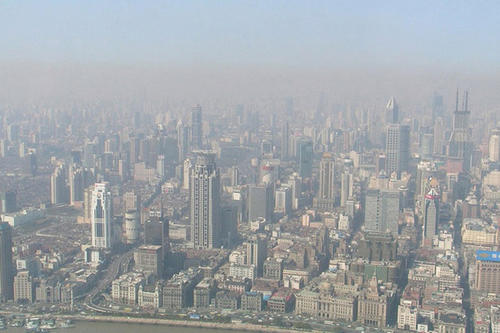“It seems nothing is taboo”
China has convened an international commission on improving its environmental situation – a conversation with Martin Jänicke, founding director of the Environmental Policy Research Centre (FFU) at Freie Universität and member of the commission
Aug 31, 2011
The air and water pollution in China is one of the biggest environmental problems. There is smog in many cities, as here in Shanghai.
Image Credit: www.flickr.com/woggle
Prof. Dr. Martin Jänicke, founding director of the Research Centre for Environmental Policy of Freie Universität Berlin, is one of six members of an international group advising the Chinese government on environmental issues.
Image Credit: Bernd Wannenmacher
Professor Jänicke, what is the commission’s job?
The commission was created to identify and map out specific measures so that the environmental goals specified in the twelfth five-year plan can be met. What makes this time special is that now, for the first time, one of the four key areas of the five-year plan has to do with environmental protection. External, international experts have also been appointed to the task force looking at this issue.
What is your first impression?
Although I have been advising government agencies since 1974, I have never before been involved in such exciting consulting activities. Here you have a gigantic, economically influential country facing a task that will decide its future. It is a huge challenge to provide suggestions to support the necessary objectives in terms of environmental policy.
The commission held its first meeting in Beijing in late July – how was it?
The members of the task force are approaching the topics with tremendous ambition. It seems nothing is taboo. People are also not afraid to raise sensitive issues, such as corruption. The members of the commission are working very concretely, and all of them want to get right to the point. We want to concentrate on the most severe environmental problems facing China right now: air and water pollution. These two areas are a top priority. What we are supposed to do is develop goals to help achieve noticeable improvements in the situation by 2020.
Are there already concrete plans?
The air situation has improved somewhat in the past few years, since flue gas desulphurization systems have been installed at major power plants on a massive scale. Nonetheless, air pollution resulting from the use of coal is a huge topic in China. As a result, the question of coal use always hangs over the discussions, even if it is not raised specifically, and even if coal use is not directly part of our tasks. I think it would be a good idea to link conventional air quality measures there with climate protection. Many cities in China suffer from smog, something we experienced ourselves in Beijing. That’s a huge problem, and also one the public can readily identify with, since it affects them directly.
How will the commission work?
We plan to meet in Beijing every two months. An interim report should be ready by the end of this year, with a detailed report by the end of 2012. The Chinese experts are, of course, much better versed in the situation in their own country, but those of us from the West will also make a big contribution and be able to make some modifications as well. Part of our work will probably also involve legitimizing proposed changes from outside in a certain sense. I think that is reasonable since this policy considerably exceeds the efforts that have been made to date.
How binding will the commission’s recommendations be on the Chinese government?
I’m optimistic about that. For example, the five-year plan that ended last year included critical suggestions that also involved the participation of Western experts. These recommendations have evidently been followed for the most part. Of course, that doesn’t automatically mean all of it was put in place right away. Implementation is far and away the biggest problem in China. The government has no issue with identifying shortcomings in the environmental situation and initiating steps to improve it, but in many cases that isn’t effective all the way down to the base.
How might that be changed?
I think it would be helpful if citizens had the right to pursue compliance with environmental laws in the courts. While the Chinese government stresses that it is important for the Chinese people to be involved if its environmental policy is to be successful, the question is how concrete consequences are drawn from that view. A lot of things also depend on how the Chinese people are involved – engagement on the part of individuals, or the people as a group, has accomplished a lot in Germany and in other industrial countries as well. Since citizens here and in other Western countries got the right to file complaints regarding environmental problems, the effectiveness of environmental laws has risen sharply.
Interviewer: Marina Kosmalla


